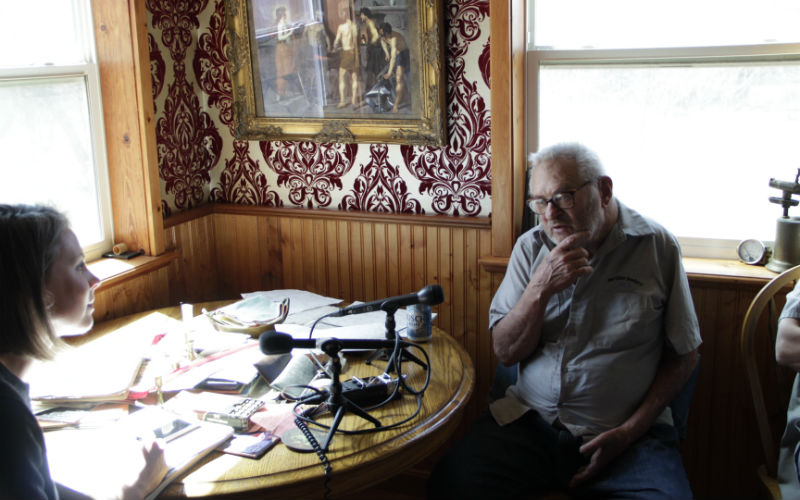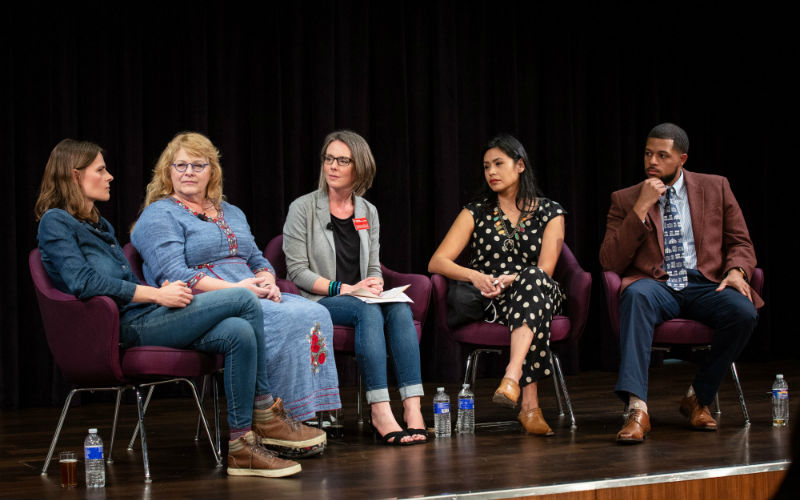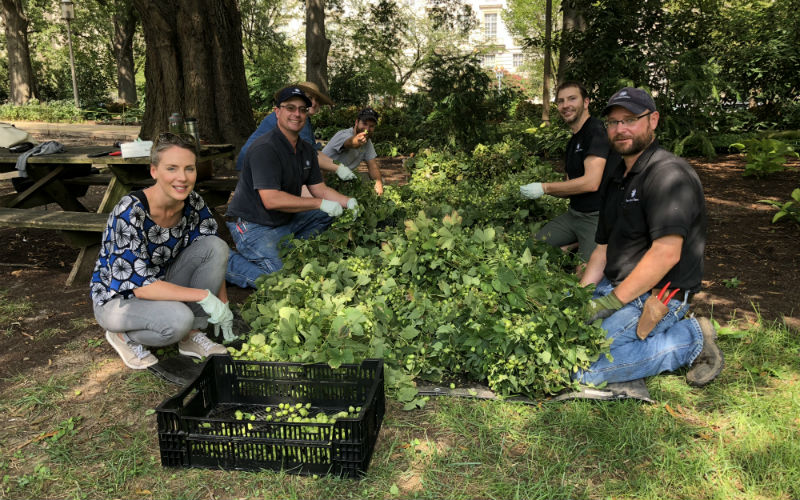More than two years ago, I joined the National Museum of American History to begin the Brewers Association-backed American Brewing History Initiative. The initiative’s goal is to build a permanent, prominent place for the history of beer and brewing at the Smithsonian. What has been accomplished toward that goal, what remains to be done, and how do you fit in? The answer to all three of those points: lots.
Collecting and sharing
As curator of brewing history, I collect objects, documents, and oral histories to add to the American History Museum’s archives, emphasizing histories of homebrewing and craft beer.
It has been an honor to collect more than 50 objects (thus far) from people who changed the American palate and revolutionized an industry. Resting in the museum storage rooms below me: the iconic white coveralls worn by Fritz Maytag, who revitalized Anchor Brewing Company in the 1960s; the first homebrew recipe typed by Charlie Papazian, BA founder and past president (see page 1 and page 2); a colorful first run of labels from Sierra Nevada Brewing Company; and the 1988 travel journal of Jeff Lebesch, whose bicycle trip around Belgium inspired him and Kim Jordan to found New Belgium Brewing Company. (Lebesch filled the notebook’s pages with notes on Belgian beers and historic bars, plus a detailed description of a stomach bug picked up during his travels). These are a handful among many objects – already acquired, in process, and yet to be acquired – that the Smithsonian will preserve in perpetuity, for the benefit (and delight) of scholars and the public.

While it is thrilling to collect an object for the Smithsonian, I feel an equal, if not greater, privilege in collecting people’s stories. On trips throughout the country, I record oral histories: formal(-ish) interviews that preserve the path of one’s career and capture memories from childhood to the present. To date, I have recorded 50 oral histories with 70 people, and am constantly scheduling more to come.
I record these with the full scope of people who make the American brewing industry the best in the world: brewers, growers, maltsters, teachers, writers and podcast hosts, homebrew shop owners, fellow historians, distributors, and even tap handle designers. I have recorded these sitting in an office or at the bar; huddled around a barrel amidst fermentation tanks; under the stone arches of a refurbished 1800s malting room; in conference hotels; and on the breezy Terrace at the University of Wisconsin-Madison’s Memorial Union. Listening to these recordings, I hear background noise ranging from taproom bustle to the continuous clink of bottling lines. At least one dog and two cats have joined these conversations. Before I hit the “record” button, I’ve been offered beer, coffee, water, a sports drink, more beer, and snuff (this from Jack McAuliffe, founder of New Albion Brewing Co.). I say yes to beer, coffee, and water, no thanks to snuff. Interviewees have laughed when reflecting on initial homebrewing escapades and cried remembering cherished mentors who have passed away. These are the details that are harder to preserve and convey in objects or documents, as powerful as those sources are. Together, oral histories, artifacts, and documents form the historian’s dream team. I am collecting a balance in order to preserve American brewing history in its fullness.
But what good is all this research if it can’t be shared? Central to my role as a public historian is sharing this history. To that end, it has been a pleasure to lead conversations about the many roles of beer in the grand scope of American history in a plethora of settings: media interviews, on social media, and at public programs and talks throughout the country, from Washington D.C. to Seattle, Pittsburgh, Nashville, New York City, Madison, and beyond.

Sharing brewing history also takes place in museum exhibitions. At the American History Museum, I am working with a curatorial team to refresh one of our most popular exhibits: FOOD: Transforming the American Table. In November of this year, a new section of this exhibition will showcase artifacts and photos from a cadre of homebrewers and microbrewers of the 1960s through 1980s. These are the seeds of change that produced the craft beer revolution. Please plan a visit to the museum to see these objects on display. This is an early step—the first sip—of a long-term brewing history effort at the Smithsonian that is just beginning.
Brewing history for the future
Much has been done to preserve American brewing history, and much remains. I will continue to collect oral histories, objects, and documents to help the brewing history archive grow. Current areas of emphasis:
- The museum seeks to collect complete business records from breweries, to build a substantial brewing business history archive at our Archives Center, a premier destination for history scholars. You don’t need to be ready to donate your records at this time, but planning for a future gift is a conversation that can happen now.
- The museum also seeks materials from the nation’s many homebrew clubs, especially club newsletters printed before the internet.
- Already, I approach my collecting with an eye to breadth and depth, but this strategy gains special relevance with the BA’s work toward a fully inclusive industry (especially via the work of the Diversity Committee and resources and outreach of Diversity Ambassador Dr. J. Jackson-Beckham) as well as the multi-year Smithsonian American Women’s History Initiative. These companion efforts encourage me to record oral histories and invite donations from industry members who are diverse in terms of gender, race, and sexual orientation. The more voices at the table, the better the beer, the richer the history.
Every day at the Smithsonian is a good one, but I also love my time on the road. Future travel will take me to new cities and regions to collect more objects and stories. The opening of the refreshed FOOD exhibition in late 2019 will come with an update to the museum website. And sharing this history – in person, an on social media – will continue to broaden the initiative’s reach.
What can you do?
If you’re reading this, you’re critical to what I do as a curator of brewing history.
- Preserve your history: objects, items on paper, and online. Some breweries have begun to organize their own archives. Not sure how? Contact me or BA archivist Karna Murphy; we can put you in touch with those who have done this or can help.
- What should you save? Brewing logs and recipes (yes, even of failed batches); sketches of your business plan, brewery design, or business logo (I will happily collect a cocktail napkin or coaster with this data); samples of marketing materials; pieces of brewing equipment that are tied to important moments in your brewing career. I want to record change over time in your thought process, business model, and approach to brewing beer.
- Are you, or is someone you know, doing unique work whose story should be preserved? Be in touch with me. Email me at mccullat@si.edu; follow me on Twitter (@theresamccu); and keep an eye on the initiative’s website: si.edu/BrewHistory.

This position has proven to be an enormous adventure. I am humbled by the responsibility to preserve the history of your life’s work and honored to make it part of the Smithsonian’s vast holdings. To American brewers and all industry members: thank you—for making the world’s best beer, for saving your stories—and onward.
Theresa McCulla, Ph.D.
Curator, American Brewing History Initiative at the Smithsonian’s National Museum of American History
Further information:
- Historian Presents Smithsonian’s Brewing History Initiative To House Small Brewers Caucus
- Craft Brewers Conference 2018 Seminar – Building a Brewing History Archive
The Brewers Association is the lead sponsor of the American Brewing History Initiative.






 Resource Hub
Resource Hub